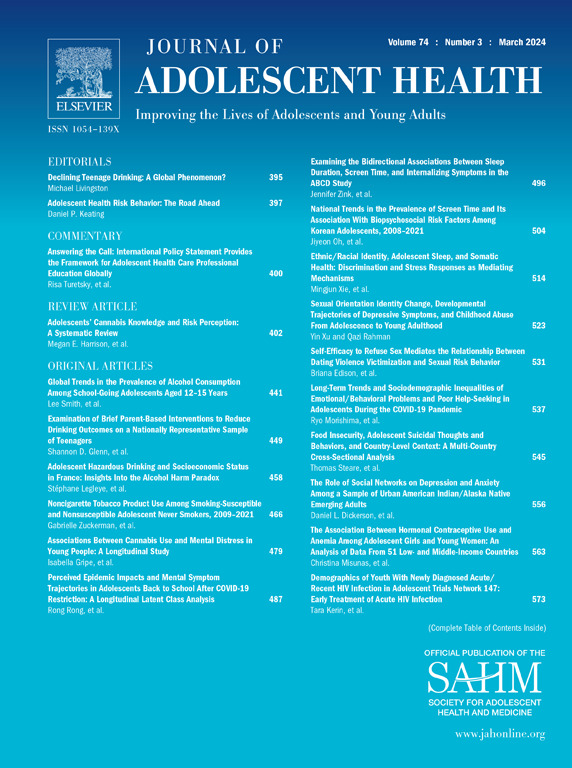警察联系和美国年轻人的心理健康。
IF 4.5
2区 医学
Q1 PEDIATRICS
引用次数: 0
摘要
目的:本研究调查了过去一年中与警察直接接触的年轻人的心理健康状况,包括不公平或侵略性的警察。方法:数据来自2019年参加收入动态小组研究的全国代表性2021年成年过渡补充的参与者。描述性分析在总体样本中提供了基于人口的警察接触措施(包括被不公平拦截、被搜身或搜查、警察言语或身体攻击)的患病率估计,并按关键的社会人口因素分层。线性回归模型量化了与警察接触与心理健康领域(即心理困扰、抑郁症状、焦虑症状和幸福感)之间的关联,并根据社会人口因素和参与者的被捕史进行了调整。结果:男性、女同性恋、男同性恋或双性恋者以及受教育程度较低的人报告频繁与警察接触的发生率最高(即在12个月内≥2次)。当考虑到攻击性警务时,出现了明显的种族差异,黑人年轻人的患病率最高。除协变量外,更频繁地与警察接触与心理健康状况较差有关,在所有结果领域均观察到可比较的影响估计。当考虑到不公平和侵略性的警务时,经历不公平的拦截与较高水平的心理困扰(β = 0.44, 95%可信区间[CI] = 0.00, 0.88)、抑郁(β = 0.48, 95% CI = 0.15, 0.81)和焦虑(β = 0.53, 95% CI = 0.17, 0.90)的关系最为强烈和一致。讨论:我们的研究结果强调了实施政策和程序的必要性,以减少对美国年轻人的频繁、不公平和激进的警察和监视,特别是在少数族裔和资源不足的社区。本文章由计算机程序翻译,如有差异,请以英文原文为准。
Police Contact and the Mental Health of Young Adults in the United States
Purpose
This study investigated mental health outcomes among young adults who experienced direct police contact — including unfair or aggressive policing — in the past year.
Methods
Data came from 2019 participants enrolled in the nationally representative 2021 Transition to Adulthood Supplement of the Panel Study of Income Dynamics. Descriptive analyses provided population-based prevalence estimates of police contact measures (including being stopped unfairly, being frisked or searched, and officer verbal or physical aggression) in the overall sample and stratified by key sociodemographic factors. Linear regression models quantified associations between police contact and mental health domains (i.e., psychological distress, depressive symptoms, anxiety symptoms, and well-being), adjusting for sociodemographic factors and participants' history of arrest.
Results
Males, lesbian, gay, or bisexual individuals, and those with lower levels of education reported the highest prevalence of frequent police contact (i.e., ≥2 times in a 12-month period). When considering aggressive policing, stark racial disparities emerged, with Black young adults exhibiting the highest prevalence. Net of covariates, more frequent police contact was associated with poorer mental health, with comparable effect estimates observed across all outcome domains. When considering unfair and aggressive policing, experiencing an unfair stop was the most strongly and consistently associated with higher levels of psychological distress (β = 0.44, 95% confidence interval [CI] = 0.00, 0.88), depression (β = 0.48, 95% CI = 0.15, 0.81), and anxiety (β = 0.53, 95% CI = 0.17, 0.90).
Discussion
Our findings underscore the need to implement policies and procedures that curtail frequent, unfair, and aggressive policing and surveillance of U.S. young adults – especially in minoritized and underresourced communities.
求助全文
通过发布文献求助,成功后即可免费获取论文全文。
去求助
来源期刊

Journal of Adolescent Health
医学-公共卫生、环境卫生与职业卫生
CiteScore
10.40
自引率
3.90%
发文量
526
审稿时长
46 days
期刊介绍:
The Journal of Adolescent Health is a scientific publication dedicated to enhancing the health and well-being of adolescents and young adults. Our Journal covers a broad range of research topics, spanning from the basic biological and behavioral sciences to public health and policy. We welcome a variety of contributions, including original research papers, concise reports, literature reviews, clinical case reports, opinion pieces, and letters to the editor. We encourage professionals from diverse disciplines such as Anthropology, Education, Ethics, Global Health, Health Services Research, Law, Medicine, Mental and Behavioral Health, Nursing, Nutrition, Psychology, Public Health and Policy, Social Work, Sociology, and Youth Development to share their expertise and contribute to our mission of promoting adolescent health. Moreover, we value the voices of young individuals, family and community members, and healthcare professionals, and encourage them to submit poetry, personal narratives, images, and other creative works that provide unique insights into the experiences of adolescents and young adults. By combining scientific peer-reviewed research with creative expressions, our Journal aims to create a comprehensive understanding of the challenges and opportunities in adolescent and young adult health.
 求助内容:
求助内容: 应助结果提醒方式:
应助结果提醒方式:


